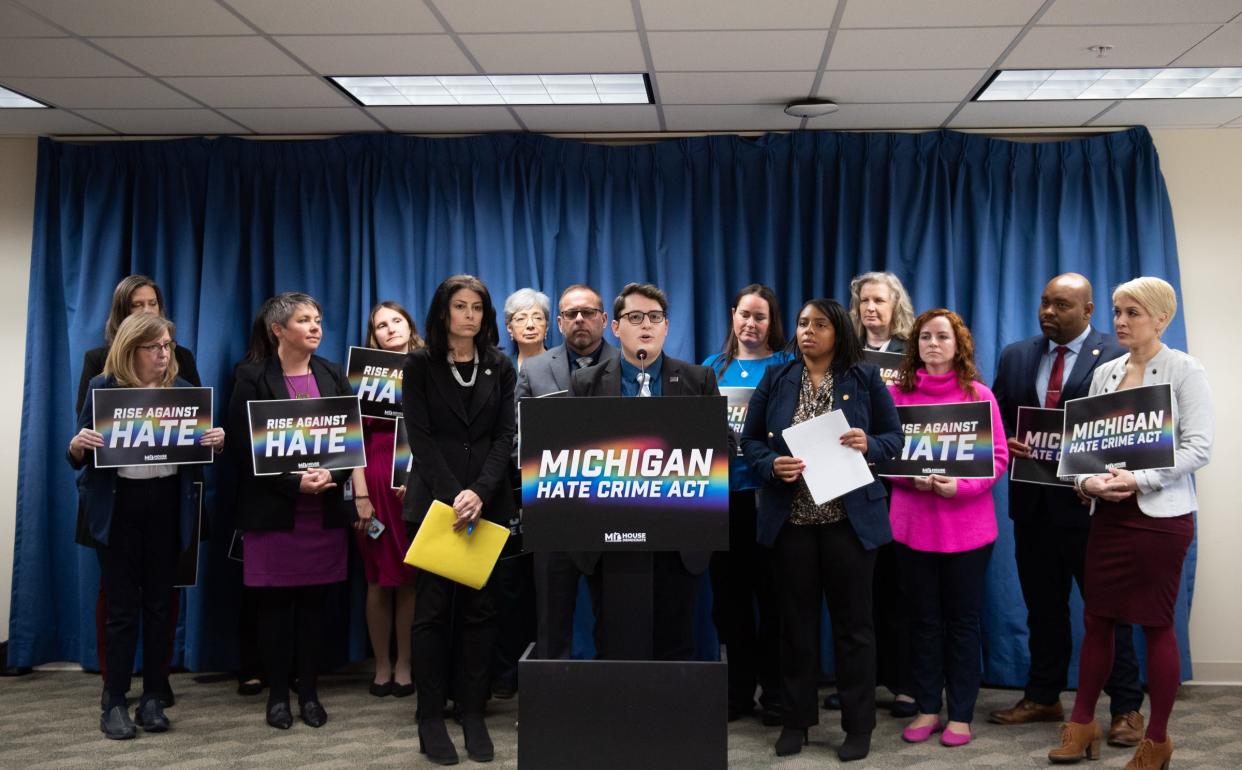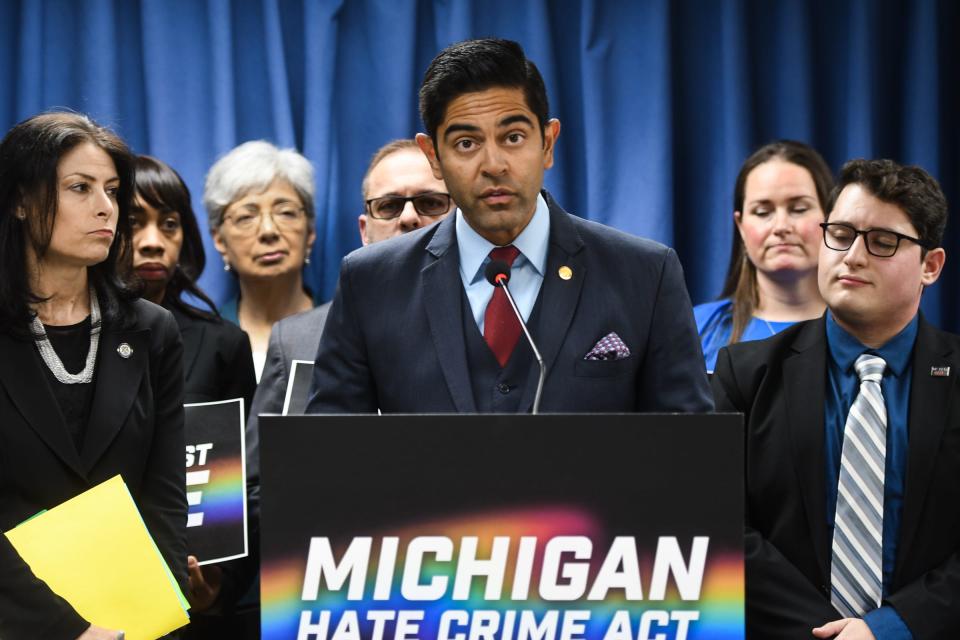‘This legislation is vital’: Michigan legislators unveil update to hate crime bills

LANSING — A group of Democratic lawmakers introduced legislation to reform and strengthen Michigan’s hate crime laws on Wednesday.
West Bloomfield state House Rep. Noah Arbit said Wednesday he and Reps. Kristian Grant, D-Grand Rapids, and Ranjeev Puri, D-Canton, have introduced four bills targeted at updating what protected classes are to be included in the state's hate crime laws, and to make it illegal to target certain religious or cultural properties.
"Hate violence is treated differently by the law because it is terroristic in nature," Arbit said. "There's never just one victim of a hate crime. An entire community is victimized too."
The trio dubbed the four bills the Michigan Hate Crime and Institutional Desecration Acts. As of Wednesday, Arbit said they do not have bipartisan support but could gain it through committee.
A message seeking comment from House Republicans was left with Jerry Ward, press secretary for Rep. Matt Hall, R-Richland Township.
The first two bills, 4474 and 4475, would expand the state’s 1988 Ethnic Intimidation Act to include protections for a person’s sexual orientation, gender identity and expression, physical and mental disability, and ethnicity and age. It also creates restorative justice for those who commit hate crimes. Currently, the Ethnic Intimidation Act protects people who're targeted because of their race, color, religion, gender, or national origin, according to state records. The U.S. Supreme Court 2020 ruling on Bobstock v. Clayton County added civil rights protections for people who are gay or transgender.
Attorney General Dana Nessel classified the laws as supplemental to the Elliott-Larsen Civil Rights Act that the Michigan Supreme Court and both chambers of government updated to include protections for someone's gender identity and expression, and sexual orientation. She pointed to a Wayne County case, People v. Deonton Rogers, where a trans woman was targeted because of gender identity.
Nessel filed a brief in support of the trans woman. Initially, a Wayne County Circuit Court judge dismissed the charge, but it was reinstated and upheld by the state Court of Appeals and Supreme Court that the suspect in the case should be charged with ethnic intimidation.
She added revising the law's name to hate crimes makes it a more appropriate term. It also prevents judges from having to reinterpret laws in a hate crime case since the charges are spelled out in the legislation.
"There's never officially been a ruling as it pertains to sexual orientation, and certainly this adds other classes as well, in addition to those," she said. "It's very important because such a large number of people are targeted based on their status as an LGBTQ+ person."

The second batch of proposals, 4476 and 4477, makes it a hate crime for someone to vandalize or otherwise desecrate places of worship, cultural or community centers, businesses or communal properties. Arbit said Michigan would join 35 other states who made such acts a hate crime.
Puri recalled a 2012 incident in Wisconsin when a white man shot and killed six people at a Sikh temple outside of Milwaukee.
"Their motives were based in hatred and bigotry and Islamophobia and incidents like this are unfortunately far too common."
The proposed legislation would have made it possible to prosecute whoever sent handwritten letters riddled with hate speech to Strange Matter Coffee Co. in Lansing and The Gathering Coffee Co. in Detroit earlier this year.
More: State Police now tracking incidents of bias against police officers in Michigan
The bills would be the state’s most significant update to the 1988 Ethnic Intimidation Act since the act’s introduction.
“This effort is personal for us,” Arbit said in the Anderson House Building. “This legislation is vital."
The bills — 4474, 4475, 4476 and 4477 — were referred to House Criminal Justice Committee. Arbit said the bills are first steps to updating and addressing the state's hate crime laws and how the data is tracked and gathered by Michigan State Police.
"So to every Michigander who's ever been made to feel unsafe, or who has ever been threatened, harm or assaulted because of who you are, this legislation is for you," Arbit said. "We will not let you down."
Support local journalism and get unlimited digital access! Subscribe for only $1 for three months!
Contact reporter Krystal Nurse at 517-267-1344 or knurse@lsj.com. Follow her on Twitter @KrystalRNurse.
This article originally appeared on Lansing State Journal: Proposal would add sexual orientation to Michigan hate crime laws

